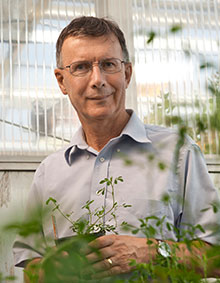ASPB President Richard A. Dixon, Ph.D, University of North Texas, has organized an important Major Symposia for the Plant Biology 2016 conference on plant specialized metabolism. Joining Dr. Dixon for the sessions will be:
- Ian Baldwin, Ph.D, Max Planck Institute, Jena
- Gregg Beckham, Ph.D, National Renewable Energy Labortory
- Joe Noel, Ph.D, Salk Institute
- Anne Osbourne, John Innes Center
Here are just a few insights Dr. Dixon would like to share with everyone about his upcoming session.
- How did you chose your topic for the symposia and why is it so important?
I was thinking about how plant specialized metabolism isn’t always viewed as central to plant biology, as are, for example, plant development or stress biology. Funding agencies can think that it is special to a particular plant or group of plants, and therefore not of general interest. All plants develop differentiated organs, or exhibit responses to cold or drought, but not all plants make polymethylated flavonoids (as just one example). But a study of plant specialized metabolism can illuminate many areas of biology- from genome structure and evolution (why are some pathways now being discovered to be encoded by clustered genes; how do plants evolve the complex array of specialized metabolites from a small number of core pathways- work of Osbourne and Noel, respectively), to ecology (a great example is tri-trophic interactions between plants, herbivorous insects and their predators- Baldwin). And then, of course, plants are central to the future development of a bio-based economy in which their remarkable chemistry is exploited to ultimately replace petroleum for fuel, polymers and specialty chemicals (Beckham).
- What will be the highlights for attendees?
I hope that the main highlight will be the cumulative realization from the 4 talks that studying plant specialized metabolism provides a powerful approach to addressing non-specialized aspects of the life and evolution of plants….and that the chemistry is really cool!
- Is there anything else you want attendees to know about the session or its presenters?
The four speakers came to plant specialized metabolism or its application from different perspectives. Ann Osbourne, Joe Noel and Ian Baldwin are well established leaders in their fields, approaching the subject from the areas of plant-pathogen interactions, structural biology and ecology, respectively. Gregg Beckham is a young scientist who works at the interface of microbiology, chemistry, and bioprocessing. While not strictly a plant scientist, he represents the type of person with whom plant scientists can interact to move plant science towards the bio-based economy.
(View the full program for information on speakers, sessions, events, and more on the Plant Biology 2016 website).
